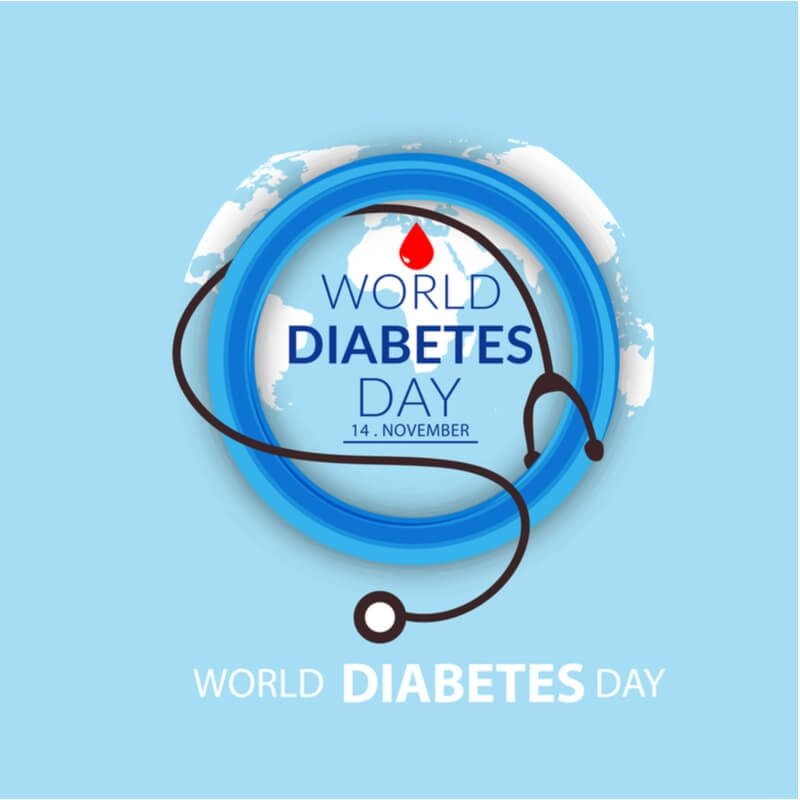
Diabetes also called diabetes mellitus is a metabolic disease that causes high blood sugar (glucose). Glucose is an important source of energy for our body, it helps in making muscles and tissues. Insulin moves glucose from the blood into the cells to be stored or used for energy. In diabetes, either your body doesn’t make enough insulin or can’t effectively use the insulin it makes.
Diabetes left untreated can damage your nerves, eyes, kidneys and other organs.
Causes of Diabetes
Type 1 Diabetes
Cause of type 1 diabetes is not known. Due to some reason, the immune system mistakenly attacks and destroys insulin-producing beta cells in the pancreas.
Type 2 Diabetes
Type 2 diabetes happens due to genetic and lifestyle factors and obesity increases the risk of type 2 diabetes.
Gestational Diabetes
Gestational diabetes occurs due to hormonal changes during pregnancy. Types of Diabetes
The different types of diabetes include:
Type 1 diabetes: It is an autoimmune disease that attacks and destroys cells in the pancreas, where insulin is made.
Type 2 diabetes: It occurs when the body becomes resistant to insulin, and sugar builds up in the blood.
Prediabetes: It occurs when the blood sugar is higher than normal, but it is not high enough for a diagnosis of type 2 diabetes.
Gestational diabetes: A woman having high blood sugar during pregnancy termed as gestational diabetes.
Symptoms of Diabetes
The general symptoms of diabetes include:
- Increased hunger and thirst
- Weight loss
- Frequent urination
- Blurry vision
- Extreme fatigue
- Sores that don’t heal
Symptoms of Diabetes in Men
Men with diabetes may have erectile dysfunction, low sex drive and poor muscle strength. Symptoms of Diabetes in women
Women with diabetes have symptoms like UTI, yeast infections and dry, itchy skin. Type 1 Diabetes Symptoms
Symptoms of Type 1 diabetes include:
- Extreme thirst and hunger
- Weight loss
- Frequent urination
- Blurry vision
- Fatigue
Type 2 Diabetes Symptoms
Symptoms of type 2 diabetes include:
- Increased hunger and thirst
- Increased urination
- Blurry vision
- Sores that are slow to heal
- Tiredness
It may also cause recurring infections as increased glucose levels make it harder for the body to heal.
Complications of Diabetes
Short term: symptoms of diabetes, dehydration, diabetic coma, infections Long Term: Kidney, heart, eye, circulation, amputation
Treatment of Diabetes
Diabetes is treated through medications, some are taken by mouth and others are available as injections.
Type 1 Diabetes Treatment
Insulin is given to people with type 1 diabetes. Insulin replaces the hormone your body isn’t able to produce. Insulin must be administered into the subcutaneous pocket between fat & muscle & avoid injection into fat or muscle.
There are four types of insulin that are used commonly:
Rapid-acting insulin: It starts to work within 15 minutes and its effect last for 3 to 4 hours.
Short-acting insulin: It starts to work within 30 minutes and lasts 6 to 8 hours. â— Intermediate-acting insulin: It starts to work within 1 to 2 hours and lasts 12 to 18 hours.
Long-acting insulin: It starts to work a few hours after injection and lasts 24 hours or longer.
Type 2 Diabetes Treatment
Type 2 diabetes can be managed with the help of diet and exercise. If it doesn’t help then you will need to take medication.
Gestational Diabetes Treatment
During pregnancy, women should monitor blood sugar level several times a day. If the blood sugar level is high then you may need insulin to lower it. Don’t worry about your baby, insulin is safe for the growing baby.
Diabetes and Lifestyle Changes
Eating healthy is a vital part of managing diabetes.
Type 1 Diabetes
Starchy and sugary foods make blood sugar levels rise rapidly. Your doctor will recommend you to limit the number of carbohydrates and you eat each day. You will also have to balance the carbs intake with the insulin doses.
Type 2 Diabetes
Balanced carbs are an important part of managing type 2 diabetes. To keep your blood sugar levels steady, eat small meals throughout the day. Have healthy foods such as:
- Fruits
- Vegetables
- Whole grains
- Protein such as poultry and fish
- Healthy fats such as olive oil and nuts
Reason for the increasing prevalence of type-2 diabetes
The disease is reaching epidemic proportions because:
- Rates of overweight/obesity have increased
- We have become a physically inactive species
- Our diets are increasingly unhealthy
Everyone should know their BMI
Overweight and obesity are diagnosed by measuring weight and height (Body Mass Index (BMI)):
BMI = Weight in Kg/ Height in metres2
- Normal = 20-25
- Overweight = 25-30
- Obese = more than 30




